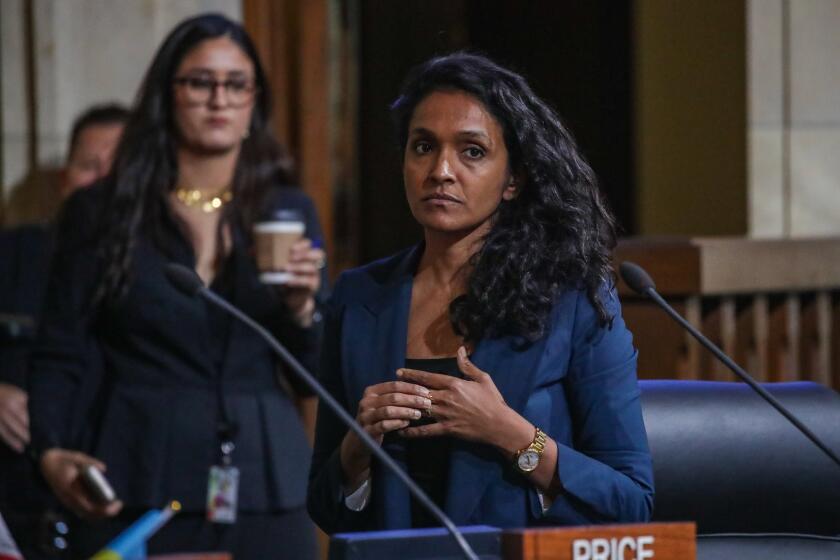With deadline looming, L.A. City Council is set to vote on new tenant protections

- Share via
With Los Angeles’ longstanding COVID-19 anti-eviction rules expiring in less than two weeks, the City Council is set to vote Friday on a proposal that would substantially expand permanent protections for tenants.
The council is under enormous pressure to finalize a new policy before the existing emergency order expires at the end of the month.
In an increasingly unaffordable city where most residents rent, many tenants and advocates fear that lifting the order without sufficient protections could spark a wave of evictions. But landlords have argued that they have been unfairly burdened by the rules, with particular hardships for independent owners.
The emergency rules were first passed amid unprecedented disruption at the start of the pandemic, along with similar measures at other levels of government. But Los Angeles’ anti-eviction protections remained in place even as other measures expired, with local leaders wary of exacerbating homelessness and overcrowding problems that had already reached crisis proportions.
Members of the City Council seem to generally agree that some new protections should be put in place. But there are varying opinions about what the new policy should look like, potentially setting the stage for some maneuvering on the council floor during Friday’s meeting.
The L.A. City Council has voted to allow landlords to resume evictions Feb. 1. But additional planned tenant protections have not passed.
The legislation package under consideration would establish a minimum threshold for eviction for tenants who fall behind on rent and require landlords to pay relocation fees in some situations where a large rent increase would result in the tenant’s displacement.
Landlords would no longer be allowed to evict tenants in any rental property, including single-family homes, unless there was unpaid rent, documented lease violations, owner move-ins or other specific reasons.
Some renters, including those in rent-stabilized units, already have “just cause” eviction protections, but making them universal would considerably expand the number of tenants covered by the protections.
The proposal would also block evictions until February 2024 for tenants who have unauthorized pets or who added residents who aren’t listed on leases, and create a new timeline for paying back rent owed from the emergency period. Tenants would have until Aug. 1 to repay back rent accumulated between March 1, 2020, and Sept. 30, 2021, and until Feb. 1, 2024, to repay back rent accumulated between Oct. 1, 2021, and Jan. 31, 2023.
The package is currently slated to be voted on as a single item, though it’s possible one or more council members could attempt to bifurcate sections of it during Friday’s meeting.
Landlords have been technically barred from evicting tenants for most reasons since March 2020 under the emergency rules, but the process has been uneven and marred by confusion.
After remaining starkly below pre-pandemic levels through 2021, countywide eviction filings surged in 2022. The number of eviction filings countywide in November and December outpaced or roughly equaled the number of filings during those same months in 2018 and 2019, according to L.A. County Superior Court records compiled by Kyle Nelson, a postdoctoral researcher at UCLA who has tracked them during the pandemic.
Tenants rights groups have rallied behind the full set of protections, while many business groups have opposed some or all of the package.
“We’re obviously opposed to the entire thing,” said Daniel Yukelson, executive director of the Apartment Assn. of Greater Los Angeles. “The last thing we need are additional regulations that are one-sided.”
But Bijan Ghaemi, a tenant organizer with Community Power Collective, argued that “tenants stand to lose much, much more than landlords.”
“Many stand to lose their lives and risk their physical and mental health, so these council members should be focused on preserving people’s physical and mental well-being and not preserving investments,” Ghaemi said at a recent council committee meeting.
Debate on the issue has also highlighted the political fault lines on the council, where an increasingly vocal progressive bloc has occasionally butted heads with more politically moderate council members on a number of issues.
Five new council members took their seats in December — including Hugo Soto-Martínez and Eunisses Hernandez, who unseated established incumbents with insurgent campaigns that focused, in part, on tenants rights.
Speaking at a tenant rights rally outside City Hall on a chilly morning last week, Councilmember Nithya Raman noted the new makeup of the council as she outlined the wins she and her allies hoped to achieve. Raman was joined at the rally by Soto-Martínez, Hernandez and Councilmember Heather Hutt, who vowed to “beg our colleagues” to pass the protections.
The legislation package was debated in the council’s Housing and Homelessness Committee on Wednesday, which ultimately recommended approval after some line-item amendments.
Raising objections about potential unintended negative effects on short-term rentals, Councilmember Bob Blumenfield fought to change language in the draft ordinance on just cause evictions to have the provisions kick in when a lease expires, or after 12 months, whichever comes first.
Get the lowdown on L.A. politics
Sign up for our L.A. City Hall newsletter to get weekly insights, scoops and analysis.
You may occasionally receive promotional content from the Los Angeles Times.
The provision, which was originally set to go into effect immediately, would bar landlords from evicting tenants unless there was unpaid rent, documented lease violations, owner move-ins or other specific reasons.
The amendment eventually succeeded on a 3-2 vote over the objections of Raman, the committee’s chair.
If passed, several aspects of the legislation would be particularly impactful for tenants who live in apartments that don’t fall under the city’s rent stabilization rules, which generally apply only to apartments built before October 1978.
The so-called just cause protections already apply to tenants living in rent-stabilized units.
The relocation fees for large rent increases would also apply only to tenants in non-rent stabilized units and units not covered by statewide rent cap provisions. That proposal would require landlords who increase rent by more than 10% or the Consumer Price Index plus 5% to pay tenants three times the fair market rent of the unit (using averages provided by the the city’s housing department) plus $1,411 in moving costs.
Times staff writer Liam Dillon contributed to this report.
More to Read
Sign up for Essential California
The most important California stories and recommendations in your inbox every morning.
You may occasionally receive promotional content from the Los Angeles Times.












